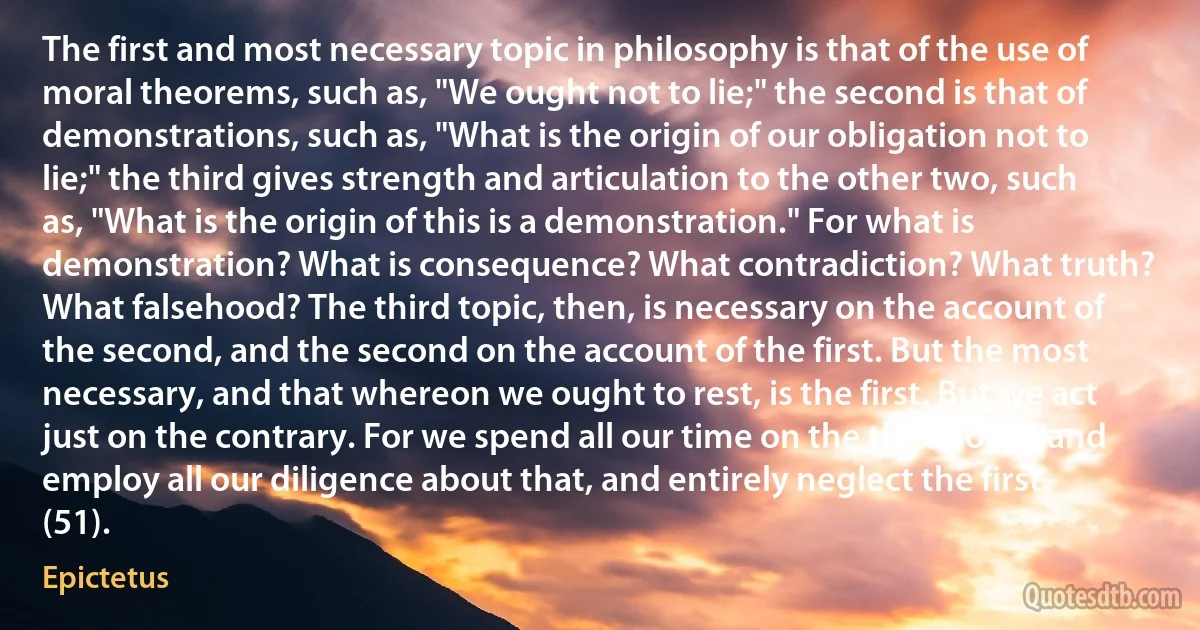
The first and most necessary topic in philosophy is that of the use of moral theorems, such as, "We ought not to lie;" the second is that of demonstrations, such as, "What is the origin of our obligation not to lie;" the third gives strength and articulation to the other two, such as, "What is the origin of this is a demonstration." For what is demonstration? What is consequence? What contradiction? What truth? What falsehood? The third topic, then, is necessary on the account of the second, and the second on the account of the first. But the most necessary, and that whereon we ought to rest, is the first. But we act just on the contrary. For we spend all our time on the third topic, and employ all our diligence about that, and entirely neglect the first. (51).
EpictetusRelated topics
account act articulation contradiction diligence employ falsehood gives lie necessary neglect ought rest second spend strength third time topic truth useRelated quotes
There is an honesty in science which demands that the best means be used for the determination of truth. Certainly there are many sorts of truth in the universe, and many aspects of truth must be taken into account if man is to live most effectively in the social organization to which he belongs. But in regard to matter---the stuff of which both non-living materials and living organisms are made---scientists believe that there is no better way of obtaining information than that provided by human sense organs. No theory, no philosophy, no body of theology, no political expediency, no wishful thinking, can provide a satisfactory substitute for the observation of material objects and of the way in which they behave. (page 9).

Alfred Kinsey
Islam has never been misunderstood. Islam is the problem. But no one is stating the truth. No one is taking a hard look at the root of terrorism which is the brain washing machine called Islam. Islam is not up to me, is not up to any Muslim – man or woman. Islam is exactly what the prophet Muhammad did and said. In order to understand Islam you have to read the biography of Muhammad. It is very traumatising. It is very shocking. He married his second wife when she was six years old. He was over fifty. [...] His third wife was Sophia. She was a Jewish woman. It was well documented, well written in our school books that he attacked her tribe. He killed her father, her brother, and her husband. At the same day, he slept with her. That's what I call Islam.

Wafa Sultan
Any religion that endorses violence is incapable of delivering spiritual enlightenment - how obvious does that have to be? - and it has no right even to call itself a religion. Without the shield of religion to hide behind, Islam would be banned in the civilized world as a political ideology of hate - and we have no obligation to make allowances for it, any more than we do for Nazism. It's a bigger threat to our freedom than Nazism ever was. Yes, both are totalitarian, and both divide the world unnecessarily into us-and-them, the pure and the impure, and both make no secret of their desire to exterminate the Jews. But we were all more or less on the same side against the Nazis, whereas the Islamonazis have got plenty of friends among people in the West who ought to know better.

Pat Condell
For what advantage is it, that the world enjoys profound peace, if thou art at war with thyself? This then is the peace we should keep. If we have it, nothing from without will be able to harm us. And to this end the public peace contributes no little: whence it is said, ‘That we may lead a quiet and peaceable life.' But if any one is disturbed when there is quiet, he is a miserable creature. Seest thou that He speaks of this peace which I call the third (inner, ed.) kind? Therefore when he has said, ‘that we may lead a quiet and peaceable life,' he does not stop there, but adds ‘in all godliness and honesty.' But we cannot live in godliness and honesty, unless that peace be established. For when curious reasonings disturb our faith, what peace is there? or when spirits of uncleanness, what peace is there?

John Chrysostom
Don't forget that God sees you and watches you when you are in pain; He perceives even the beating of your heart. Consequently, He will not leave you without consolation and His fatherly protection. Naturally, the saints rejoiced in their afflictions; as for us, let us at least manage to accept affliction or pain patiently.
My child, pray within your heart, and the name of Jesus will become for you a comforting balm so that you can bear this trial of yours in a way which benefits you. You will greatly benefit from this trial if you submit yourself to it patiently. So again I say to you, with the almighty armor of prayer continually approach the omnipotent Lord more often, and you will come to know how He wondrously lifts the burden of pain and marvellously gives rest to sufferers.

Ephraim of Arizona
